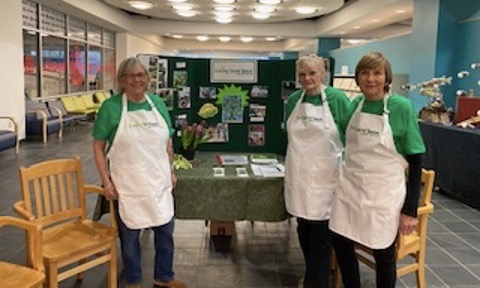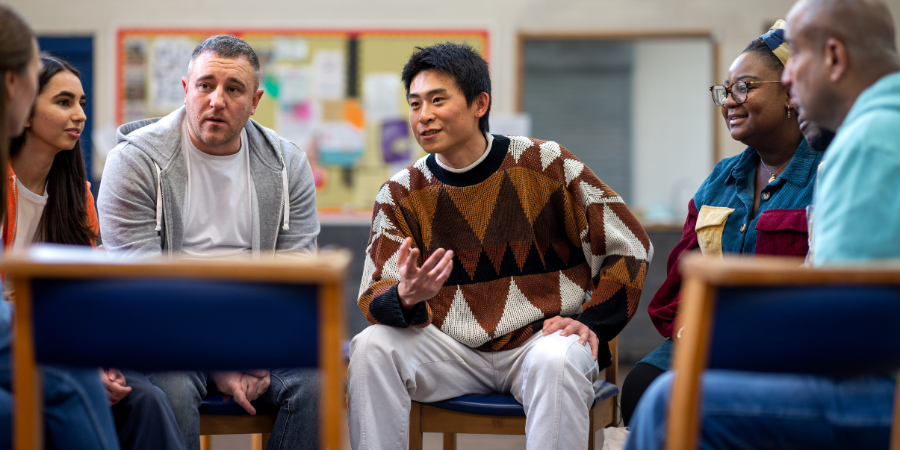This resource is also available in French. Click here to access the French version.
 We heard many different answers and definitions throughout the two-day event celebrating the first year of Tamarack’s Communities Climate Transitions’ cohort. Experts, movers and shakers, philanthropists, and community leaders from across the country gathered under one virtual roof to discuss crucial challenges and innovations in community-led climate action.
We heard many different answers and definitions throughout the two-day event celebrating the first year of Tamarack’s Communities Climate Transitions’ cohort. Experts, movers and shakers, philanthropists, and community leaders from across the country gathered under one virtual roof to discuss crucial challenges and innovations in community-led climate action.
It was an extraordinary couple of days exploring topics such as climate investing, the decolonization of climate action, intersectional policymaking, and the power of collective impact. The event was also a great occasion to celebrate the 19 Canadian communities that committed, over a year ago, to come together, learn from each other and advance their climate action plans.
Throughout it all, one question anchored our exchanges: What does climate justice/equity mean to you?
So, what happens when we bring together engaged, informed, and dedicated people and ask them how to put equity at the centre of community climate action?
Here are five moments that marked CCT’s first national event:
1. Come Together
“Consumer pressure and local organizing pushes government to do more. That’s been the formula always” stated Elizabeth May, Member of Parliament and Leader of the Green Party of Canada. As we reflect on individual actions and commitment we make and hope to contribute to a better future, Elizabeth May reminded us that we aren’t alone in wanting change, but that there is power in numbers. 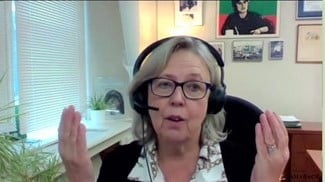
2. Advocate Locally
We watched an insightful and honest panel of engaged and committed mayors from across the country who shared their unfiltered successes and failures in leading the way towards a more sustainable future. Cities and city leaders have such a crucial role to play, and Mayors urged residents to reach out to their officials – especially the reluctant ones – and speak their language: “figure out what their mandate’s priorities are and show them the alignment with local climate action” advised Mayor Cam Guthrie from Guelph, Ontario.
Convincing elected officials to take action by looking at the financial, ethical and political benefits was a strong takeaway here, particularly when it comes to engaging fellow residents and elected officials on doing this work while centering equity and justice.
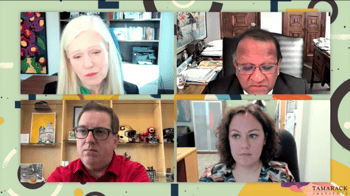
3. Plan Inclusively
“Nothing about us, without us” was another poignant quote by André-Yanne Parent, Executive Director of the Climate Reality Project Canada. Advancing certain groups towards a greener and more sustainable future and leaving others behind is a moot point. “A climate action that hasn’t embedded equity and taken into consideration systematically marginalized groups is already failing” said Sadhu Aufochs Johnston, former City Manager of Vancouver. In fact, the real push for greater climate action is meaningless without clear follow-through and a strong, future-oriented commitment. 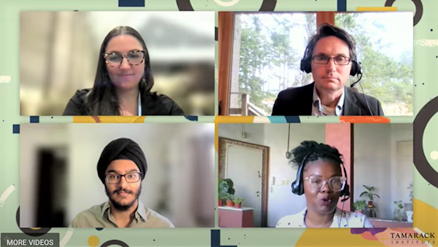
4. Be Intersectional
We hosted two workshops that introduced several tools to facilitate the design of a ‘well-being economy’ that thinks about people and planet alike, one that advances the interconnected forms of justice we need: climate, health, economic, gender, racial and beyond. We heard from an all-female panel of philanthropists whose day-to-day focuses on supporting the types of innovations that demand systems change and long-term impacts.
They referred to the importance of being aware that, “as a funder, many of the templates/systems we work with might not be relevant to the groups who are the most deserving. For this reason, adaptable processes and open communication go a long way”, flagged Paulette Senior, President & CEO of the Canadian Women’s Foundation. The interconnectedness of multiple forms of justice is the main reason that collective work and intersectoral collaboration between investors, communities, leaders, and experts yield the best results.
5. Put Into Practice
On both days, afternoon Masterclasses offered participants an opportunity to apply some of the concepts introduced earlier in the day and take a more practical approach getting familiar with them. The Masterclass on embedding JEDI (Justice, Equity, Diversity and Inclusion) into your organization held space for an honest discussion of how key concepts such as power, privilege and intersectionality are shaped by our individual experiences and spheres of influence.
Participants walked away with tools to empower and enable them, and practical tips to apply those learnings in their own organization and daily lives. Another Masterclass on using Asset-Based Community Development (ABCD) offered group work and resources to build on the existing strengths of communities across the country.
Communities can be catalysts for change and, as the event showed, questions about fairness and equity are at the forefront of today’s conversation about meaningful climate action.
How do we work together to ensure everyone has the same access to the tools and resources necessary to face the inevitable challenges of the future? And what happens if we fail to garner courage to ask the tough questions and challenge decision-makers on outdated modes of thinking?
These are some of the questions the remarkable group of participants and speakers came together to jointly explore and learn more about, leaving many of us at the end of Day 2 reenergized, inspired, and ready to act.
Let’s not lose the momentum, will you join us in continuing this important work, too?
Get Involved!
Working groups across the country are leading the way towards equitable change and a climate transition that is fair and just. If you are a community, a citizen-led group, or a government representative, join the CCT 2023 cohorts – applications are open until December 13, 2022, for the English cohort and January 6, 2023, for the French cohort:.
- If you missed the event or would like to relive some of the best moments, you can find the recordings in English and in French here.
- To hear from some of the 19 communities on their experience being part of the 2022 cohort – watch this video.
- To read more about the 19 trailblazing communities who launched the program – read this article.
- If you would like to apply and be part of the 2023 cohort – in English – click here before December 13, 2022
- If you would like to apply and be part of the 2023 cohort – in French – click here before January 6, 2023
- Interested in becoming a Tamarack member? Download the membership package here.

